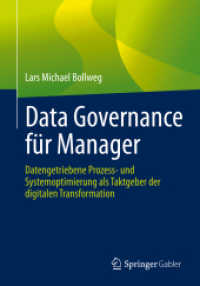Full Description
Bitter Scrolls is a broad survey of our "sacred texts," both Holy Writ (Hebrew Bible, New Testament, Qur'an) and secular masterpieces, from the Epic of Gilgamesh to the work of William Butler Yeats and D.H. Lawrence, whose canonical status often exempts them from the sort of hardnosed, commonsense criticism that we uniformly apply to contemporary literature and art. A frank look at this literature reveals a stunning combination of bias and blindness toward women. Acknowledging this would, in any case, be painful and depressing; but confronting it in some of our greatest minds-Homer, Aeschylus, Virgil, Boccaccio, Rabelais, Shakespeare, Milton, Pope, Wordsworth, and so on-must inevitably give rise to profound, if no longer unusual, culture shock. With few exceptions, we can no more remake the canon than we can redesign our family tree, but we need to come to terms with the toxic contents of our art.
Contents
Chapter 1 Introduction, In Their Own Words
Chapter 2 1. Gilgamesh, Off to a Very Bad Start
Chapter 3 2. The Mightiest, Manliest Murderers
Chapter 4 3. Clytemnestra's Ghost: Aeschylus Puts Women in Their Place
Chapter 5 4. Moses: Misogyny in High Places
Chapter 6 5. St. Paul: Christianity's Founder Founders
Chapter 7 6. Muhammad Keeps the Ladies in Line
Chapter 8 7. Boccaccio and the Renaissance Playboy Philosophy
Chapter 9 8. Rabelais and the Triumph of Youmanism
Chapter 10 9. Thoroughly Unmodern Willie: Shakespeare's Women
Chapter 11 10. Milton Confronts the Biblical Babe
Chapter 12 11. Alexander Pope's Dissonant Classical Symphony
Chapter 13 12. Wordsworth and the Helpless Female
Chapter 14 13. Tolstoy's Women: Barefoot in the Dacha
Chapter 15 14. W.B. Yeats: The Last of the Red-Hot Lovers
Chapter 16 15. D.H. Lawrence: Hierophant Unhinged
Chapter 17 16. An Alternate Feminist Canon?-Forget About It
Chapter 18 17. Leftover Toxins




